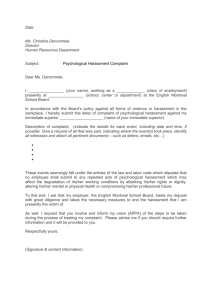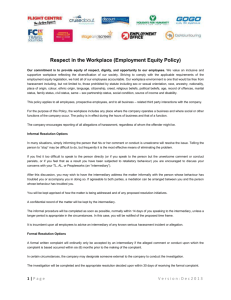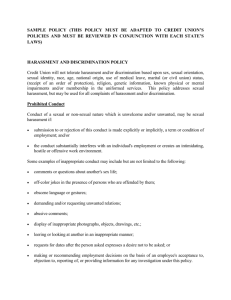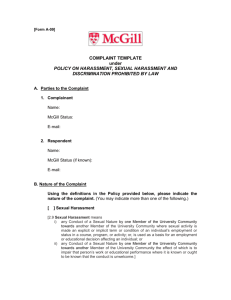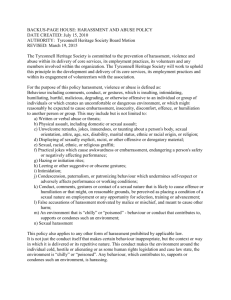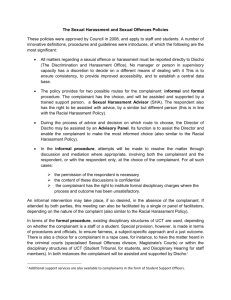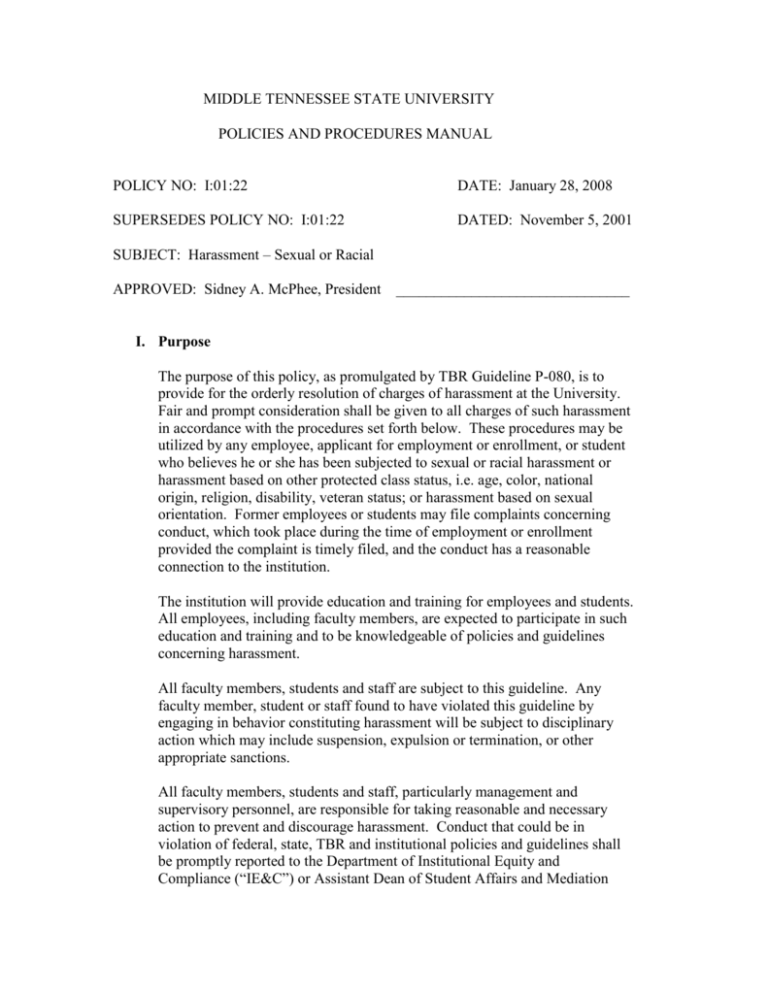
MIDDLE TENNESSEE STATE UNIVERSITY
POLICIES AND PROCEDURES MANUAL
POLICY NO: I:01:22
DATE: January 28, 2008
SUPERSEDES POLICY NO: I:01:22
DATED: November 5, 2001
SUBJECT: Harassment – Sexual or Racial
APPROVED: Sidney A. McPhee, President
_______________________________
I. Purpose
The purpose of this policy, as promulgated by TBR Guideline P-080, is to
provide for the orderly resolution of charges of harassment at the University.
Fair and prompt consideration shall be given to all charges of such harassment
in accordance with the procedures set forth below. These procedures may be
utilized by any employee, applicant for employment or enrollment, or student
who believes he or she has been subjected to sexual or racial harassment or
harassment based on other protected class status, i.e. age, color, national
origin, religion, disability, veteran status; or harassment based on sexual
orientation. Former employees or students may file complaints concerning
conduct, which took place during the time of employment or enrollment
provided the complaint is timely filed, and the conduct has a reasonable
connection to the institution.
The institution will provide education and training for employees and students.
All employees, including faculty members, are expected to participate in such
education and training and to be knowledgeable of policies and guidelines
concerning harassment.
All faculty members, students and staff are subject to this guideline. Any
faculty member, student or staff found to have violated this guideline by
engaging in behavior constituting harassment will be subject to disciplinary
action which may include suspension, expulsion or termination, or other
appropriate sanctions.
All faculty members, students and staff, particularly management and
supervisory personnel, are responsible for taking reasonable and necessary
action to prevent and discourage harassment. Conduct that could be in
violation of federal, state, TBR and institutional policies and guidelines shall
be promptly reported to the Department of Institutional Equity and
Compliance (“IE&C”) or Assistant Dean of Student Affairs and Mediation
2
Services as required herein. Such reporting should occur when information
concerning a complaint is received formally or informally.
Supervisory personnel shall discuss the subject regularly in their staff meetings,
insure that employees have access to copies of the MTSU policy & brochure, and
provide to IE&C documentation on all activities conducted within their areas.
II. General Statement
Sexual and racial harassment have specifically been held to constitute forms of
discrimination prohibited by Title VI, Title VII of the Civil Rights Act of 1964, as
amended, and Title IX of the Educational Amendments of 1972. In addition to sex
and race, age, color, national origin, religion, disability, and veteran status have
also been designated as protected classes under Federal and State laws. Failure to
properly investigate and address claims of harassment based on protected class
status could subject the Institution to liability and penalty under the relevant
Federal and State laws.
A. Sexual Harassment
Generally, sexual harassment may be defined as unwelcome sexual advances,
requests for sexual favors, and other verbal or physical conduct of a sexual
nature when one of the following criteria is met:
1. submission to such conduct is made either explicitly or implicitly a term or
condition of the individual's employment or of the individual's status in a
program, course, or activity;
2. submission to or rejection of such conduct by an individual is used as a
basis for employment decisions, a criterion for evaluation, or a basis for
academic or other decisions affecting such individual; or
3. such conduct has the purpose or effect of unreasonably interfering with an
individual's work performance or educational experience or creating an
intimidating, hostile, or offensive work or educational environment.
Sexual harassment can take many forms, but most sexual harassment falls
into three categories: verbal, visual, and physical. Some examples of
behavior that may constitute sexual harassment are:
Making employment, educational, or other decisions based on
acceptance or rejection of sexual advances.
Refusing to hire, promote, or grant or deny certain privileges because of
acceptance or rejection of sexual advances.
Promising a work-related benefit or grade, in return for sexual favors.
3
Suggestive or inappropriate communications, e-mail, notes, letters, or
other written materials displaying objects or pictures which are sexual in
nature that would create hostile or offensive work or living
environments.
Sexual innuendoes, comments, and remarks about a person's clothing,
body, or activities.
Suggestive or insulting sounds.
Whistling in a suggestive manner.
Humor and jokes about sex that degrade men or women.
Sexual proposition, invitations, or pressure for sexual activity.
Use in the classroom of sexual jokes, stories, remarks or images in no
way germane to the subject matter of the class.
Implied or overt sexual threats.
Suggestive or obscene gestures
Patting, pinching, and other inappropriate touching.
Unnecessary touching or brushing against the body
Attempted or actual kissing or fondling.
Coerced sexual intercourse.
Sexual Assault.
The examples listed above are not exclusive, but simply represent types of
conduct that may constitute sexual harassment. The brochure titled "No
Sexual harassment at MTSU," provides additional examples.
Not every act that might be offensive to an individual or a group will be
considered harassment. Whether the alleged conduct constitutes sexual
harassment depends upon the record as a whole and the totality of the
circumstances, such as the nature of sexual advances and/or the context within
which the alleged incident occurred. Harassment does not include verbal
expressions or written material that is relevant and appropriately related to
course subject matter or curriculum.
Please note that stalking and sexual assaults may be criminal acts and as such,
investigation and processing by the criminal justice system, local police,
campus security, and crisis intervention centers may supersede or occur in
addition to the process developed under this policy.
B. Racial Harassment
Generally, racial harassment is defined as any person's conduct, which
unreasonably interferes with an employee's or student's status or performance
by creating an intimidating, hostile, or offensive working or educational
environment. Harassment on the basis of race, color, or national origin,
includes offensive or demeaning treatment of an individual, where such
treatment is based on prejudiced stereotypes of a group to which that
individual may belong. It includes, but is not limited to, objectionable
4
epithets, threatened or actual physical harm or abuse, or other intimidating or
insulting conduct directed against the individual because of his/her race, color,
or national origin. Title VII requires employers to take prompt action to
prevent bigots from expressing their opinions in a way, which abuses or
offends their co-workers.
III. Consensual Relationships
Intimate relationships between supervisors and their subordinates, and between
faculty members and students are strongly discouraged due to the inherent
inequality of power in such situations. These Relationships could lead to undue
favoritism or the perception of undue favoritism, abuse of power, compromised
judgment or impaired objectivity.
Engaging in a consensual relationship with a student over whom the faculty
member has either grading, supervisory, or other evaluative authority (i.e.,
member of dissertation committee, thesis director, etc.) constitutes a conflict of
interest. The faculty member must take steps to remove the conflict by assigning a
different supervisor to the student; resigning from the student's academic
committees; and/or by terminating the relationship at least while the student is in
his/her class. Likewise, it is a conflict of interest for a supervisor to engage in a
consensual relationship with a subordinate over whom he or she has evaluative or
supervisory authority. The supervisor must take action to resolve the conflict of
interest by, for example, assigning another individual to supervise and/or evaluate
the subordinate.
IV. Procedures
A. General
1. The following procedures are intended to protect the rights of the
aggrieved party (hereinafter, "the complainant") as well as the party
against whom an allegation of harassment is lodged (hereinafter, "the
respondent") as required by state and federal laws. Each complaint shall
be properly investigated and, when warranted, appropriate disciplinary
action taken against the respondent.
2. The Legal Counsel shall always be consulted prior to investigation.
References to "Legal Counsel" shall mean either the TBR Office of
General Counsel or MTSU University Counsel, as appropriate.
3. In situations that require immediate action, because of safety or other
concerns, the institution shall take any action, which is appropriate, e.g.,
suspension with pay pending the outcome of the investigation. Legal
Counsel shall be contacted before any immediate action is taken.
5
4. Each employee, applicant for employment or enrollment and student shall
be notified of the name, office, and telephone number of the designated
investigators responsible for assuring compliance with this policy, Board
policy, and federal law.
Trained staff within the IE&C Department, which also monitors Title IX
compliance, shall investigate complaints against employees. The Assistant
Dean of Judicial Affairs & Mediation Services shall investigate complaints
against students. Hereinafter, the term "investigator" shall be used to reference
these individuals. (After consultation with Legal Counsel, the Director and
Assistant Dean may designate an individual(s) to conduct the investigation or
give assistance).
B. Filing Complaints
1. Any current or former student, applicant for employment or current or
former employee who believes he or she has been subjected to harassment
or who believes that he or she has observed harassment taking place at
MTSU shall present the complaint to the IE&C Department unless the
complaint is against a student. If the complaint is against a student, then
the complaint should be presented to the Assistant Dean of Judicial Affairs
and Mediation Services.
2. Complaints must be brought within 365 days of the last incident of
harassment. Complaints brought after that time period will not be pursued
absent extraordinary circumstances. The determination of whether the
complaint was timely or whether extraordinary circumstances exist to
extend the complaint period must be made in conjunction with Legal
Counsel.
3. Every attempt will be made to get the complainant to provide the
complaint in writing. The complaint shall include the circumstances
giving rise to the complaint, the dates of the alleged occurrences, and
names of witnesses, if any. (Appendix A is a sample complaint form).
The complainant shall sign the complaint. However, when the
complainant refuses to provide or sign a written complaint the matter will
still be investigated and appropriate action taken. Complaints made
anonymously or by a third party shall also be investigated to extent
possible.
4. If the complaint does not rise to the level of harassment, the complaint
may be dismissed without further investigation after consultation with
Legal Counsel. The complainant shall be informed of other available
processes such as the employee grievance/complaint process, or a student
non-academic complaint process.
6
C. Investigation
1. The Legal Counsel shall be notified of the complaint whether written or
verbal, as soon as possible after it is brought to the attention of the
investigator, and the investigation will be under the direction of the Legal
Counsel. All investigatory notes and documents shall be attorney work
product. The investigator shall notify the President that an investigation is
being initiated.
2. When the allegation is against a member of the IE&C Department or the
Associate Dean of Judicial Affairs & Mediation Services, it shall be
presented to the President who will identify an individual who has been
trained to investigate such complaints to carry out the responsibilities
assigned pursuant to this guideline. When the allegation of harassment is
against the President of the institution, the IE&C Department shall notify
the TBR Office of the General Counsel who will assign an investigator
who will make his/her report to the Chancellor.
3. When the respondent is a student, the investigator will investigate the
complaint in compliance with the procedures outlined in this policy. If a
finding of violation is made, any resulting disciplinary action will be
undertaken in compliance with the institution's student disciplinary
procedure.
4. When a student is involved as the complainant, the respondent or an
individual interviewed, all documentation shall be subject to the
provisions and protections of the Family Educational Rights and Privacy
Act (FERPA) and Tennessee Code Annotated Section 10-7-504(a) (4),
which requires that certain student disciplinary records be subject to
disclosure pursuant to a public records request.
5. In consultation with and under the direction of Legal Counsel, the
investigator shall conduct an investigation of the complaint. The purpose
of the investigation is to establish whether there has been a violation of the
guideline. In conducting the investigation the investigator may interview
the complainant, the respondent, and other person believed to have factual
knowledge related to the investigation.
6. To the extent possible, the investigation will be conducted in such a
manner to protect the confidentiality of both parties. However, the
complainant shall be informed that the institution has an obligation to
address harassment and that, in order to conduct an effective investigation,
complete confidentiality cannot be guaranteed. Information may need to
be revealed to the respondent and to potential witness. However,
information about the complaint shall be shared only with those who have
a need to know about it. A complainant will be informed that if he or she
7
wants to speak privately and in confidence about the harassment, he or she
may wish to consult with a social worker, counselor, therapist or member
of the clergy who is permitted, by law, to assure greater confidentiality.
Additionally, the complainant will be given assurances that measures will
be taken against the Respondent should there be retaliation against him or
her. Retaliation is prohibited and should be reported to the investigator
immediately.
7. The investigator shall notify in writing the respondent within five (5)
working days of receipt of the complaint. The respondent shall respond in
writing to the complaint within (5) working days of notification. The
respondent shall be notified by the investigator that any retaliation against
the complainant is strictly prohibited regardless of the outcome of the
investigation and may, in itself, be grounds for disciplinary action. If
either the complainant or respondent is a student, the investigator shall
communicate the prohibition against disclosure of personally identifiable
information with regard to the student, based on FERPA.
8. The investigator shall meet with both the complainant and the respondent
individually for the purpose of resolving the complaint informally. If
informal resolution is successful in resolving the complaint, a report of
such, having first been reviewed and approved by Legal Counsel, shall be
submitted to the President.
9. If informal resolution is unsuccessful, the investigator shall draft a report
summarizing the investigation, which shall be sent to Legal Counsel for
review. After review and approval by Legal Counsel, the report shall be
submitted to the President within twenty (20) working days following
receipt of the complaint. In situations where more than 20 working days is
needed to complete the investigation, such as difficulty in locating a
necessary witness, or complexity of the complaint, additional time may be
taken. The Legal Counsel and the complainant shall be notified.
Each report shall outline the basis of the complaint, including the dates of
the alleged occurrences, the response of the respondent, the findings of the
investigator, all attempts to resolve the complaint informally, a
determination of whether there was a violation of the guideline, and
recommendations regarding disposition of the complaint. No working
papers, statements, etc., generated in the investigation should be attached
to the report to the President.
10. If after investigation, there is insufficient evidence to corroborate the
complaint or, in any situation in which the complainant refuses to
cooperate in the investigation, it may be appropriate to discuss the
complaint with the respondent, informing him or her that he or she is not
being accused of a policy violation, but that the conduct alleged, had it
8
been substantiated, could be found to violate this policy. Any
investigation and subsequent discussion shall be documented and a report
submitted as set forth in this procedure. It shall also be noted that conduct,
which does not rise to the level of actionable harassment may,
nevertheless, provide a basis for disciplinary action against the respondent.
11. The President shall review the investigator's report, make a final
determination as to whether a violation has occurred and determine what
the appropriate resolution should be. This determination shall be in
writing, with copies provided to the complainant and the respondent.
12. If the investigation reveals evidence that a violation of the guideline has
occurred, the President may meet with the respondent and/or the
complainant and attempt to resolve the problem by agreement. This shall
be done in consultations with Legal Counsel. Appropriate steps shall be
taken to ensure that the harassment will not reoccur.
13. After completion of the investigation and any subsequent disciplinary
proceedings, all documentation shall be forwarded to Legal Counsel.
However, the President's determination, the investigator's report and
documentation of any disciplinary action taken against the respondent
should be placed in a file maintained on campus. This file shall be
maintained in a location designated by the President.
14. Some documents may be subject to the Public Records Act and thus open
to public inspection. Other documents may be protected under FERPA,
the attorney/client privilege, or attorney work product and would not be
releasable. If a Public Records request is received, Legal Counsel must be
consulted prior to the release of any documents.
15. A complaint found to have been intentionally dishonest or maliciously
made, will subject the complainant to appropriate disciplinary action.
D. Hearing
1. The respondent must file the request for a hearing within ten (10) working
days following receipt of the President's determination.
2. If the respondent requests a hearing, he/she shall be advised of the
established institutional procedures available for resolution of the matter
in question which will generally be the procedure for the hearing of a
grievance before a grievance committee.
3. The grievance hearing procedures shall include the following minimal
requirements:
9
a. Notice to the respondent of the hearing, which must include a
summary of the facts that form the basis of the violation; the date, time
and place of the hearing; and, the rights afforded the Respondent
during the hearing process.
b. The right of the respondent to present his or her case.
c. The right of the respondent to be accompanied by an advisor who may
assist the R respondent but may not advocate on his or her behalf.
d. The right of the respondent to call witnesses in his or her behalf.
e. The right of the respondent to confront and cross-examine witnesses
against him/her.
4. In the following situations the respondent must be given the option of
either an institutional hearing, or of having the hearing held pursuant to
the Tennessee Uniform Administrative Procedures Act (TUAPA):
a. The respondent is a support staff or faculty employee whom the
President has determined should be suspended without pay, demoted,
or terminated; or
b. The respondent is a student whom the President has determined should
be suspended or expelled.
The election to utilized either hearing process (institutional or TUAPA)
must be in writing, signed by the respondent, and must expressly waive
the option not selected.
If the respondent elects to be heard, Legal Counsel shall be notified
immediately.
5. When a complaint involves a tenured faculty member, the same informal
and formal procedures set out above shall be utilized. Tenured faculty
members shall have the same right to elect hearing procedures as set out in
this section. However, where the investigation results in a finding that the
harassment policy was violated and the president concurs with that finding
and determines that procedures pursuant to MTSU Policy II:01:05A
should be undertaken in consideration of the termination of a tenured
faculty member, the matter will then proceed directly to a hearing under
MTSU Policy II:01:05A for termination of tenure.


